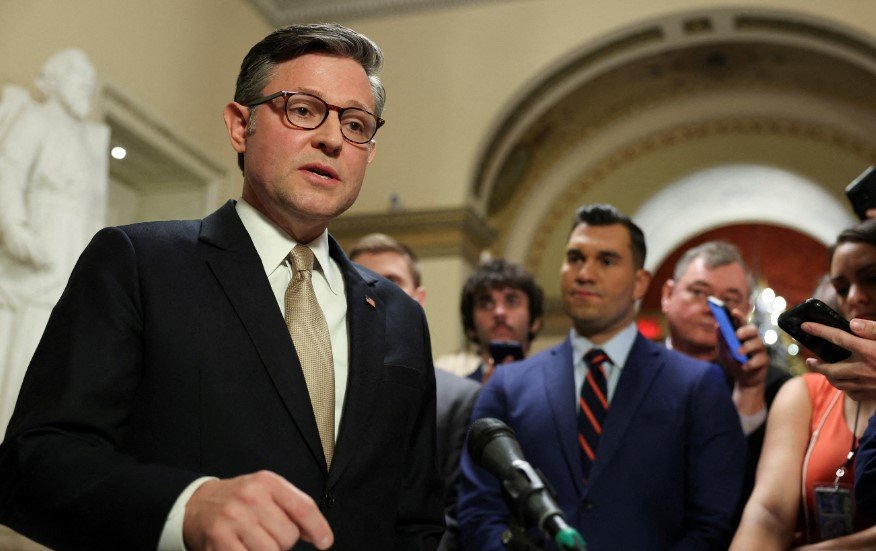U.S. House Speaker becomes highest-ranking official to visit Israeli settlement, drawing fire from Palestinians and raising fresh concerns in Washington
In a move seen as deeply provocative by Palestinian leaders, U.S. House Speaker Mike Johnson made an unannounced visit Monday to the Israeli settlement of Ariel, a community built in occupied West Bank territory widely considered illegal under international law.
The trip has quickly ignited criticism both at home and abroad, as Johnson becomes the highest-ranking American official ever to set foot in an Israeli settlement — a gesture Palestinians call a “blatant violation” of global legal norms and a dangerous nod to extremist settler agendas.
A Highly Charged Visit Amid a Violent Summer
The timing of Johnson’s visit couldn’t have been more fraught. In the past month alone, two U.S. citizens have been killed in settler-led attacks in the West Bank. Tensions are already razor-thin, with Israeli forces escalating military operations, home demolitions, and forced displacements across the territory — all while Gaza remains under a deepening humanitarian blockade.
Johnson’s brief but symbolic stop in Ariel came just days after calls from the Biden administration to de-escalate violence in the occupied territories. His presence there, cameras rolling, sent a starkly different message.
“This is not just a photo-op,” one Palestinian official told Al Jazeera on condition of anonymity. “It is a political statement — and a reckless one.”

Palestinian Authority Denounces “Clear Breach of Law”
The Palestinian Ministry of Foreign Affairs wasted no time issuing a scathing condemnation.
“The visit is a blatant violation of international law,” the ministry said in a statement Monday evening. “Settlements are illegal under the Fourth Geneva Convention, and any legitimization of them by foreign powers undermines the international consensus.”
The ministry added that Johnson’s visit undermines Washington’s stated position opposing settlement expansion and casts doubt on its credibility in future negotiations.
One sentence stood out in their statement:
“The ministry affirms that all settlement activity is invalid and illegal and represents a war crime under international law.”
That line — harsh, direct, and deliberately worded — marked a rare official accusation of war crimes directed at an active member of the U.S. Congress.
Settler Violence Escalating — With American Victims
It’s no secret that the West Bank has seen a surge in violence this year, particularly from settlers emboldened by the current right-wing Israeli government. But the killing of two U.S. citizens in July has added a deeply personal and political edge to the crisis for Washington.
One of the victims, 17-year-old Omar Ismail, held dual U.S.-Palestinian citizenship. He was shot dead by settlers near Nablus. A week later, 43-year-old Ahmed Tahan, also an American citizen, was killed in similar circumstances.
Neither case has seen meaningful arrests or charges filed.
And yet Johnson, standing in Ariel, said nothing publicly about those killings. There was no condemnation of settler violence. No mention of the American lives lost.
Instead, his visit was framed — in Israeli media and among hardline settler groups — as an “endorsement” of their presence in the West Bank.
What Johnson Said — And Didn’t Say
The Speaker’s office released a brief press statement, noting Johnson’s “support for Israel’s right to self-defense” and commitment to “deepening U.S.-Israel relations.”
But there was no reference to settlements, the two-state solution, or the victims of settler attacks.
One Republican aide, speaking off the record, said Johnson’s team saw the visit as a “show of strength” and a response to “woke foreign policy criticism” from the Biden camp.
But Democratic lawmakers weren’t having it.
Senator Chris Van Hollen, a Maryland Democrat who sits on the Foreign Relations Committee, called the visit “deeply irresponsible” and “damaging to U.S. credibility.”
Diplomatic Repercussions Could Follow
Johnson’s move could have ripple effects — both abroad and inside the Beltway.
For one, Arab states watching from the sidelines — including key U.S. allies like Jordan and Egypt — have long opposed settlement expansion and could view the visit as a betrayal of past American commitments.
Meanwhile, inside the Biden administration, there’s growing concern that Johnson’s trip undermines months of delicate diplomacy aimed at calming regional tensions.
An anonymous State Department official told The Washington Post that the department was “not briefed” on the visit and would not have endorsed it if they had been.
It also complicates future peace efforts, many of which hinge on keeping U.S. policy — at least in public — in line with international law.
Settlements Like Ariel Remain Flashpoints
Ariel isn’t just any settlement. It’s one of the largest in the West Bank, home to over 20,000 Israelis, and deep inside territory Palestinians envision as part of a future state. Its location, population, and infrastructure make it a central piece of the debate over permanent borders.
Here’s what makes Ariel significant:
-
Founded in 1978, Ariel is 20km inside the Green Line
-
Home to Ariel University, an institution the U.S. doesn’t officially recognize for funding
-
Ariel’s municipal council has openly pushed for annexation by Israel
Under international law — backed by the U.N. and most of the world — all Israeli settlements in occupied Palestinian territory are illegal. The U.S., until recently, upheld that position, though Donald Trump’s administration blurred those lines.
Johnson’s visit threatens to erase what little daylight remains between fringe and formal policy.
